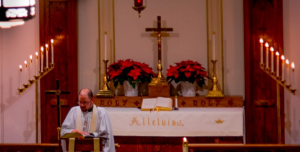- Nov 26, 2019
- 11,118
- 5,677
- 49
- Country
- United States
- Faith
- Generic Orthodox Christian
- Marital Status
- Celibate
This year we did the Vigil on Saturday night; it was a long service but very beautiful; the transition from darkness to light was very moving. Good Friday was the Adoration of the Holy Cross, followed by the stripping of the altar.
Dude you have the best Lutheran parish in North America...
Upvote
0

